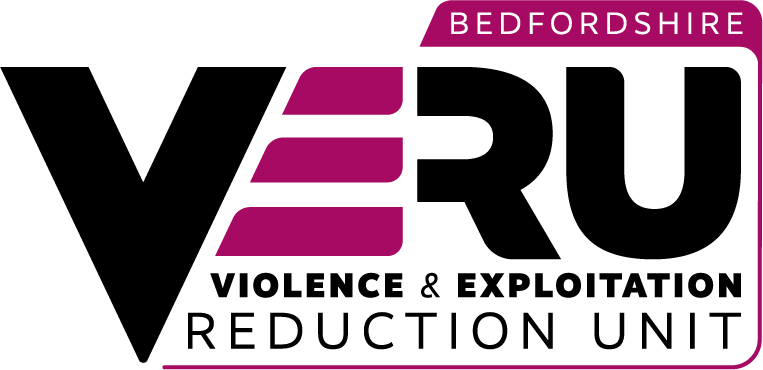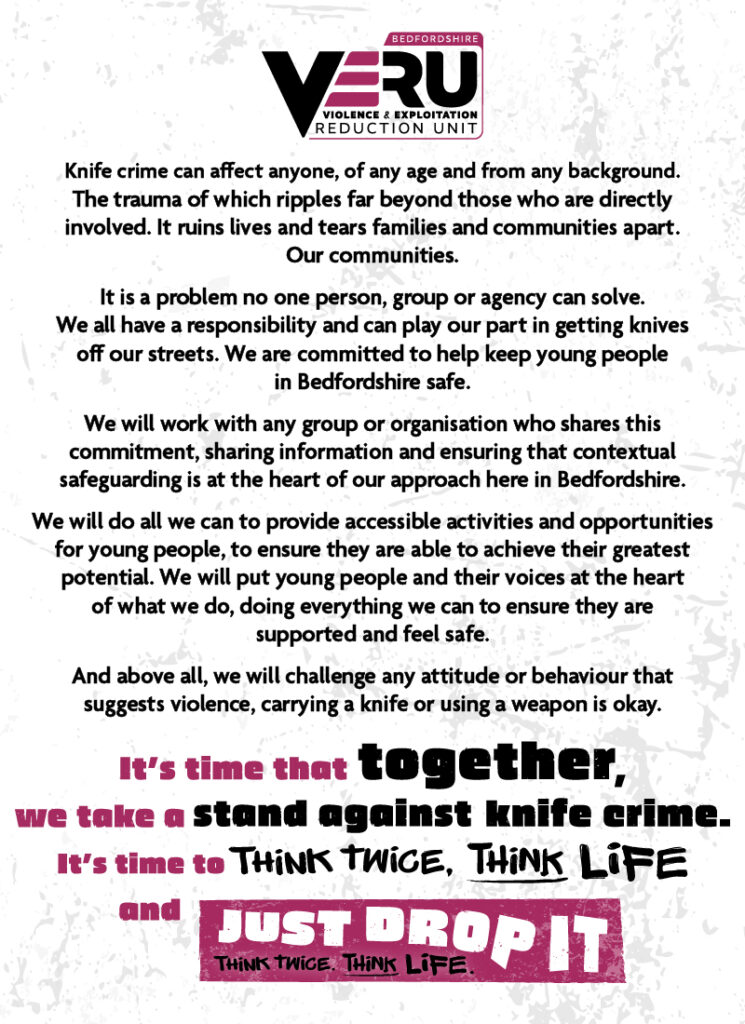
Young people, organisations, charities and community groups have all come together to take a stand against knife crime.
We know the reasons young people might carry a knife can be complex.
They may feel scared.
They may think having a weapon gives them protection.
They might be self-conscious, trying to prove something to others, or being bullied at school.
They may have been groomed or exploited into drug dealing or other forms of organised crime.
We are not here to judge anyone.
All we want you to know is that there is a path to a brighter future where you can go knife free.
Ashish's Story
Ashish Nahar died of a single stab wound to the heart after he was attacked while sitting on a bench in Jubilee Park, Bedford in June last year.
He was 25.
A 16-year-old boy was convicted of his murder and sentenced to life in prison with a minimum term of 14-and-a-half years.
Less than a year on, his family has spoken out about the devastating effects of knife crime in a new short film as part of our Just Drop It campaign.
“It hasn’t been easy, reliving the worst days of mine and my family’s lives, but I have to believe that by doing so Ashish’s death was not in vain.
“It’s sad to think of the number of times this has and will be said by mothers grieving their sons, but knife crime has to end.
“Ashish was a blessing in every sense of the word. That blessing was taken from us in a cowardly attack on a young man who was just finding his way in life and reaping the rewards of a fresh start.
“To say we never saw ourselves being in this position would be a huge understatement, but as a family, we want to see change and if it takes sharing our experience and calling for young people to ‘Just Drop It’, then that’s what we will do.”
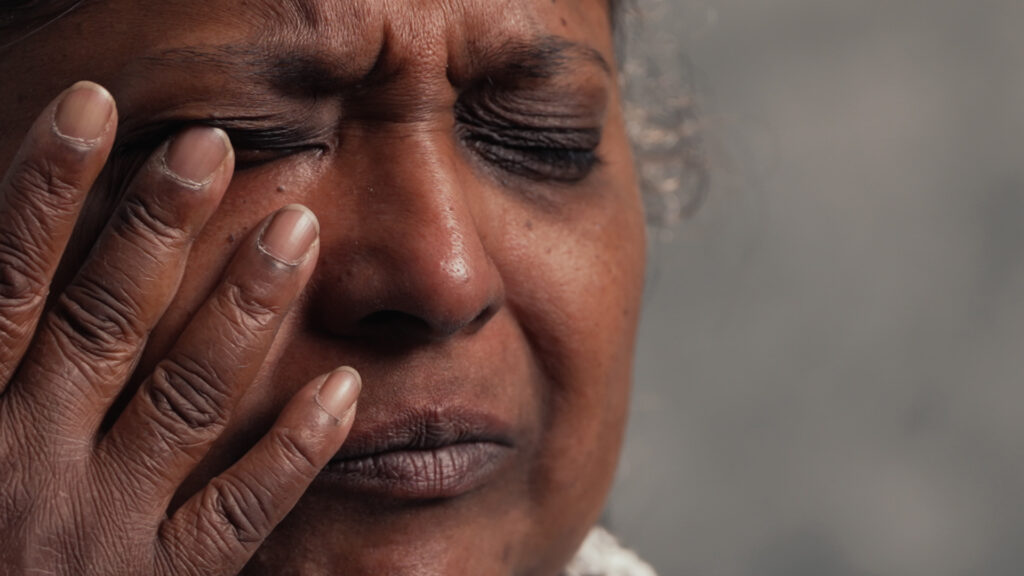
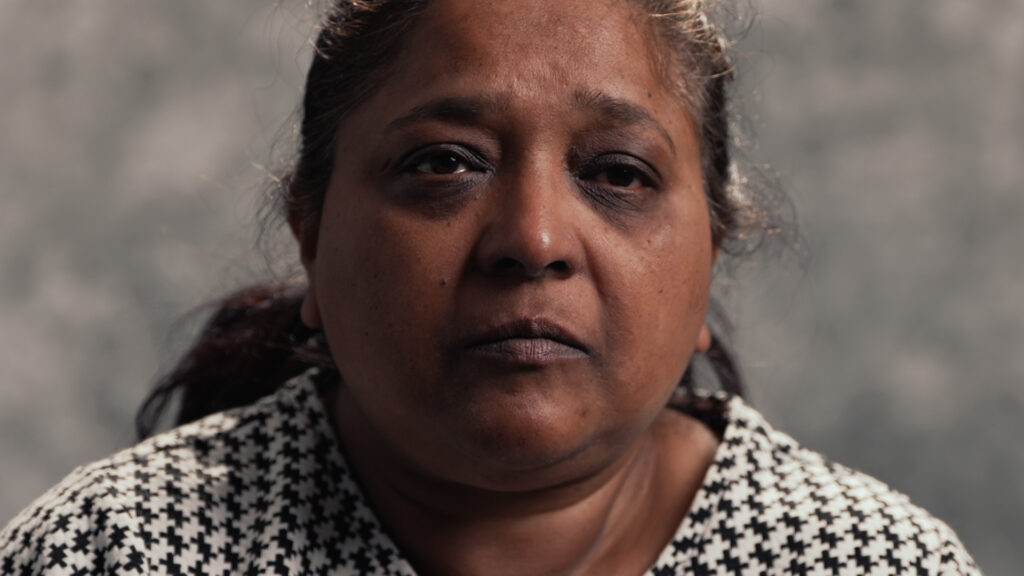
AJ's Story
Roseann Taylor has been the inspiration behind the Just Drop It campaign. Her son Azaan was tragically stabbed to death in Luton in 2018. He was just 18 years old.
He was a fantastic young man known by his loved ones as ‘AJ’.
He was never in trouble, never part of a gang.
AJ loved fast cars, motorbikes, skateboarding and travelling. Still finding his feet, AJ knew academic or office work wasn’t for him. Whatever he would eventually do, it would have to allow him to get stuck in and get his hands dirty.
However, his life was tragically cut short when he was stabbed in an unprovoked attack by four strangers while he was out walking with his girlfriend.
Roseann now works with young people, helping them to walk away from a life of crime and forge a better future for themselves.
She doesn’t want any family or young person to suffer like she has. We are sharing AJ’s story so people will
Think Twice. Think Life. And Just Drop It.
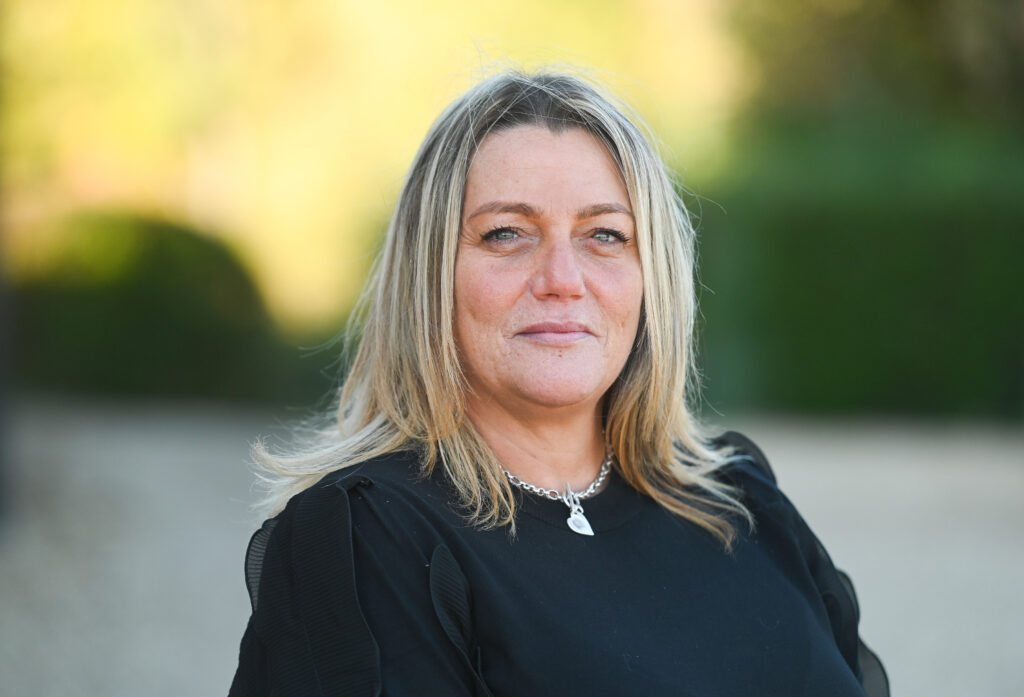
You can support our campaign by sharing content on social media and pledging to support our goal to tackle knife crime in Bedfordshire.
Take action
We care and we are here to support you. Equally, there are numerous organisations that have made it their mission to support young people to live their best lives while remaining safe and well.
Are you under pressure to deal drugs or carry a knife, gun or other weapon? Are you already involved in a gang or crime? Are you already carrying a knife?
If so, you may feel like your life is out of control, like you’re constantly looking over your shoulder and that there’s no way out. You might think it’ll be worse trying to get out of a gang and that you need to carry a weapon for protection.
The truth is, it’s more dangerous to keep going as you are. But you’re here looking for help, which is a really good start and there are many organisations and charities who want to help you.
What can you do?
There’s lots of help and support out there.
If you’re scared for your safety, talk to someone – whether it’s us at the VERU, a parent, teacher, youth worker or a police officer for example. No one wants to see you get hurt.
If you don’t feel as though you can talk to your parents, a teacher or the police, then talk to a professional in confidence. ChildLine could be your first call on 0800 1111 – their counsellors can support young people 24 hours a day.
What else can you do?
- Weapons – if you don’t take it with you, it won’t be used.
- Ignore taunts or call-outs on social media. These are just words – no amount of disrespect is worth putting yourself or others at risk of physical harm.
- While walking away is often the hardest thing to do, it’s the safest and won’t get you into trouble with the police – staying alive to take care of your family and reach your potential has to be worth it. See the bigger picture.
- We want people to get support and report
What should you do if you’ve already injured someone?
If you’ve used a weapon to injure someone you’re probably feeling a mixture of different emotions: fear, guilt, anger, worry.
You must own up. It will help if you proactively speak to the police. The level of trouble you’ll be in will be far worse if you’re found out later than if you do the right thing now.
If you want to speak to the police, you can do this via the Bedfordshire Police website. If it’s an emergency, call 999 now.
You can also call Fearless charity anonymously on 0800 555 111 or visit their website. You don’t need to give your name and your call won’t be traced.
Have you been the victim of knife crime?
If you’ve been a victim of knife or gun crime, you’re probably going through a whole mixture of emotions – fear, anger, pain. Perhaps it was a random attack, or maybe you’re in a gang and this was always going to happen sooner or later. Maybe you get bullied, and the bullying has got a whole lot worse.
Being injured by a knife or gun is no doubt one of the worst things that has happened to you. Even being threatened with a weapon can be incredibly frightening. Don’t be embarrassed to ask for help – you need support and there are lots of ways for you to speak to someone anonymously.
If the police haven’t already been notified, then you or someone close to you should contact them straight away through their website. If it’s an emergency and you still feel like you’re in danger, you need to call 999 now.
How can you get rid of a knife?
There are weapons bins across Bedfordshire where you can safely dispose of knives. You can dispose of your knife at any one of the following knife bins.
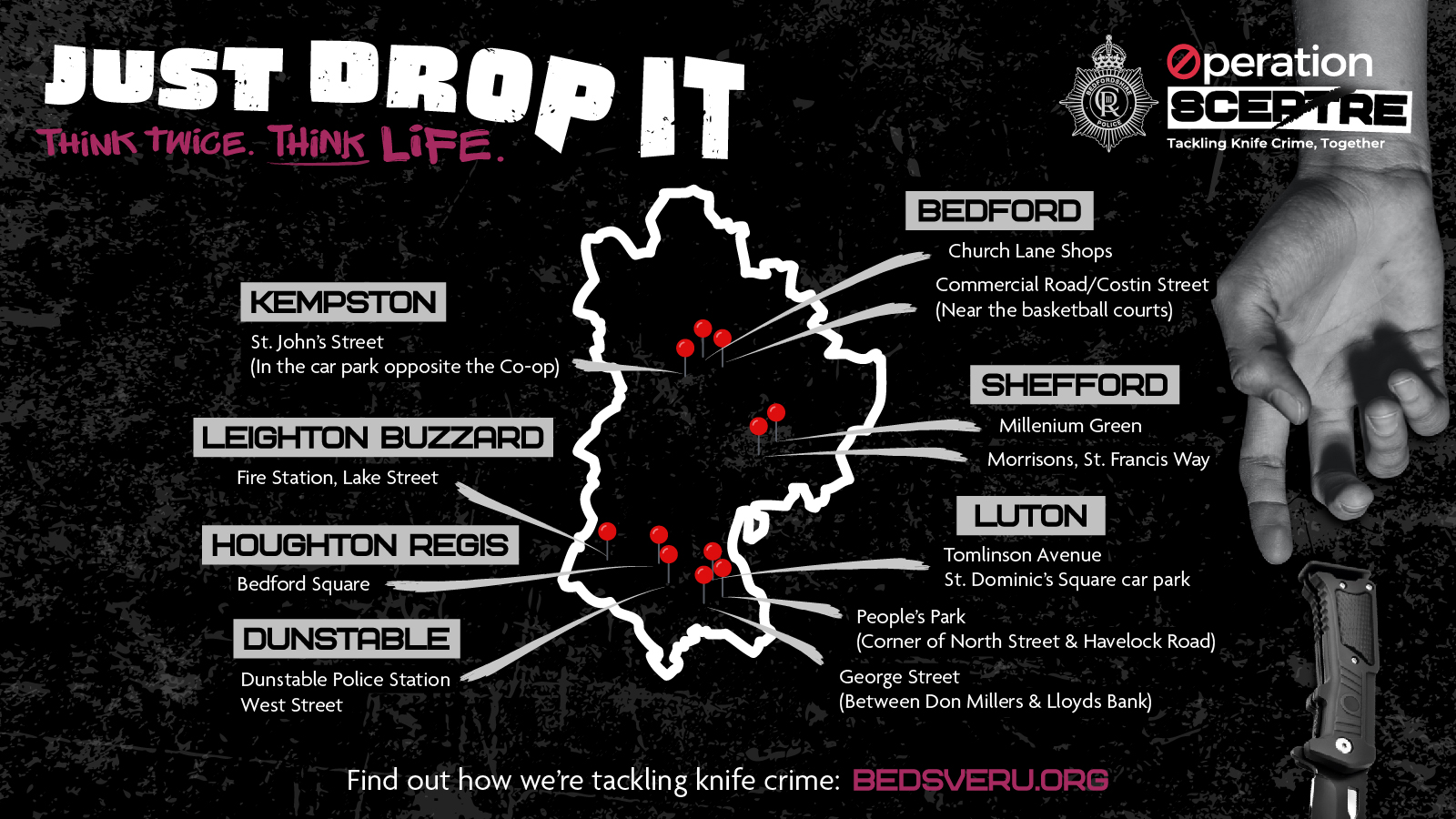
- Bedford Square, Houghton Regis
- Dunstable Police Station
- Leighton Buzzard Fire Station
- Tomlinson Avenue, Luton (in the car park for St. Dominics Square)
- People’s Park, Luton (on the corner of North Street and Havelock Road)
- Just off St George’s Street, Luton (between Don Miller’s and Lloyds Bank)
- Millennium Green, Shefford
- Morrisons, St Francis Way, Shefford
- Church Lane shops, Goldington, Bedford
- Commercial Road/Costin Street, Bedford (near the basketball courts)
- St John’s Street, Kempston (in the car park opposite the Co-op)
We would advise people to ensure that the knife is wrapped up and secure as if you are stopped by a police officer, you would need to prove that you are on your way to a weapons bin to actually dispose of it, as opposed to someone who is found with a knife concealed in their clothing.
- Have they been a victim of knife crime?
- Do you think your friend or family member is perhaps carrying a knife?
- Or is at risk from a gang?
- Are they being threatened or asked to do something they shouldn’t?
- Do you think they might be involved in crime?
Victim of knife crime
If a friend or family member has been a victim of knife crime then you, or someone close to your friend, should contact the police if they’ve not already been notified.
If you want to speak to the police, you can do this via the Bedfordshire Police website. If it’s an emergency, call 999 now.
You can also call Crimestoppers charity anonymously on 0800 555 111 or visit their website. You don’t need to give your name and your call won’t be traced.
Plus – the VERU is here to help anyone affected by knife crime, whether you are a victim, witness or a friend or family member of someone directly affected. You can get in touch with us through our website.
How else can you help?
Depending on what type of incident they’ve been involved in, your friend or child may be experiencing many types of emotion:
- fear
- anger
- denial (pretending it didn’t happen)
- pain
- loneliness
- depression
You might be one of the only people they feel they can be honest with. Encourage them to speak to us or the police if they haven’t already. If you don’t think they’re going to make the call, perhaps speak to someone like a parent or teacher, or call the police yourself.
There are lots of other places where you can report and get support.
I think they’re involved in knife crime
It can be extremely worrying to think that your child, family member or friend is involved in something as dangerous as gang, knife or gun crime.
Maybe they’re not carrying a weapon themselves but are associated with people who are. The natural reaction is to panic – but this won’t resolve the situation and could push them away.
The consequences of taking no action, though, could be extremely serious for your child or someone else. You must do something about it.
If you discover they’ve been carrying a weapon, you’ll almost certainly question why. If they’re willing to talk about it, they might give you a number of reasons:
- fear
- to gain respect
- protection
- to steal
- to intimidate or harass
- peer pressure or being pressured into carrying it for someone else
- defence
Whatever the reason, it is likely to have something to do with fear. Even if they don’t admit it, a young person getting involved in weapons will be frightened and continuously looking over their shoulder. They’ll be waiting for the police to stop and search them, or to be confronted by others, and in the end will be grateful for a ‘way out’ of that lifestyle.
What can you do?
The consequences and dangers of knife crime and becoming involved in crime are real.
Sometimes having difficult conversations, while uncomfortable at the time, can be vital in preventing something more serious from happening. For example – telling someone’s parents that you think their son or daughter is involved in something they shouldn’t, or having a tough conversation with your child is better than having to visit them in hospital or attend their funeral; or telling the police a friend is carrying a knife will be better than seeing your mate stabbed or watching them stab someone else.
While that is the worst case scenario – it is the harsh reality and we want to do everything we can to prevent any of that from happening to another young person. Help us to help them.
Being a good friend isn’t always easy. But there are lots of places you can go to for help – either for a friend or yourself. You can talk to the VERU, parents, teachers, youth workers, various charities or the police who can provide support to you, both to prepare for difficult conversations and then to support you afterwards. Never be afraid to report and get support.
You can talk to your friend’s parents, their teacher, social services or the police. Whatever your relationship is, if they are at risk – tell someone.
Even if nobody gets injured, there can be serious and life-long consequences to carrying a knife.
If you get caught with a knife
Get caught and you face a prison sentence of up to four years. That’s just for possessing a knife in a public place.
If you hurt someone there will be other charges to answer and you could go to prison for longer.
Your loved ones will suffer
No parent or grandparent wants to think their child or grandchild is going to have to go to prison. For many, the only nightmare that’s worse is the thought of you getting injured or killed.
Any brothers and sisters you have will be devastated at the prospect of you not being around for months or even years. They could face lots of hassle at school and on the street too—and you won’t be around to stick up for them.
Your family could be at risk
If you pull a knife on someone, their mates could come looking for you at home. This could put your family in danger, as well as your friends.
Your future might be ruined
If you get convicted for a knife crime you’ll have a criminal record. Sentences over 30 months stay on your record for life.
People with criminal records—especially for violent behaviour—find it much more difficult to find work.
They are barred from doing some jobs altogether, like working around children, young people or the elderly, or even being a bouncer in a pub or club.
Criminal records for violence also make it harder to get into college or university.
Holidays and travel will be difficult
Lots of countries don’t let people in who have criminal records, like the USA, Canada and Australia—even just on holiday.
Help is out there. Get support and report.
- In London, just 2 per cent of young people carry a knife.
- Possession of a knife carries a prison sentence of up to four years even if it’s not used.
- Boys and young men aged 12-25 are most likely to be convicted of carrying a knife.
- If you are caught with a knife it doesn’t matter if it was for your own protection or you were carrying it for someone else – you will be arrested and prosecuted. Self-protection is not a reasonable excuse for carrying an offensive weapon.
- The legal definition of an offensive weapon includes anything intended to be used to harm another person, like a sharpened comb. It’s also illegal to carry a ‘disguised knife’ – anything with a concealed blade or sharp point that’s made to look like an everyday object (like a pen, cigarette lighter or lipstick).
- Carrying a knife increases the chance of you getting hurt, and those around you like your friends. Think as well about the impact that getting stabbed could have on the people you care about like your mum.
- There is no ‘safe place’ to stab someone. Get stabbed in the heart and you can lose all of your blood in one minute. But a wound in the arm or the leg can still kill and young people have died from wounds to the leg because an artery was severed.
- Knife crime can affect anyone, not just people in gangs. Innocent bystanders can get caught in the middle of other people’s disputes and suffer trauma, serious injuries or worse.
- Police can – and do – stop and search anyone they think is carrying a weapon. If they stop you and find a weapon, you will face serious consequences which may stay with you for the rest of your life.
- It’s illegal to carry a knife or offensive weapon in a public place without a reasonable excuse. Reasonable excuses include those who need them for work, like fishermen or carpet fitters, but this only applies while they’re actually at work.
- Even if it’s not you who does it, if someone is injured or killed by a knife in your presence you could be sent to prison for murder or attempted murder in what is referred to as ‘joint enterprise’. Young people in Bedfordshire have been jailed under these circumstances before – don’t let it happen to you.
- It’s illegal for shops to sell knives to anyone under 18 and buying a knife under the age of 18 is an offence. This includes kitchen knives and even cutlery.
- Knives are the most common weapons used in killings of young people.
- If you have a criminal record you might not be accepted into a college or university, get a job, or travel to some countries, like the USA, Canada or Australia.
JUST DROP IT
Real Life Stories
People right here in Bedfordshire are living with the devastating impacts of knife crime.
We want to give them a platform to tell their story.
This can be those who have lost loved ones to knife crime, through to people who used to carry knives and professionals working tirelessly to stop violence and exploitation.
Here you can see just some of the real life reasons why you should Think Twice. Think Life. And Just Drop It.
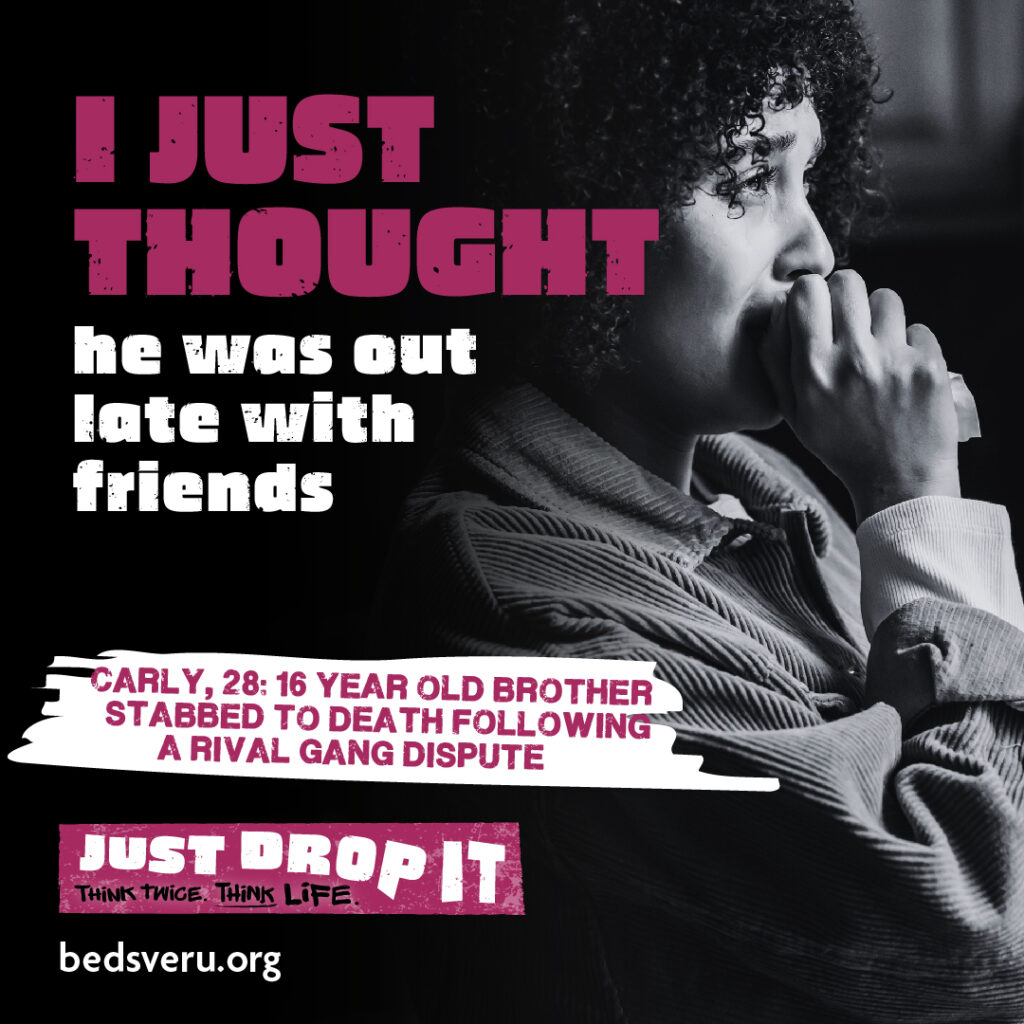
JUST DROP IT
Isaac’s Story
Rapper Isaac Stone was stabbed to death in Bedford in 2014 after a row which started over a music video.
He was 19 years old. Four people were jailed for his murder.
His sister Channitta Lendore and some of Isaac’s friends previously spoke out about their experience.
A different perspective
Voice of our partners
Meet Joe
A paramedic with the East of England Ambulance Service NHS Trust for more than 23 years, Joe has seen his fair share of devastating injuries as a result of violence.
In support of our campaign, Joe has shared his experience in attending a fatal knife attack. Sadly, it’s not the only one, not for him, nor thousands of other paramedics and police officers across our country.
Often times people will think that these types of incidents don’t impact emergency workers because it’s their job. The reality is that violence and knife crime affects everyone.
The victim, the perpetrator. Their families and friends. Innocent witnesses, and our emergency workers who do their utmost to preserve life.
There is no positive outcome to carrying a blade, so do yourself a favour and #JustDropIt.
Voice of our partners
Meet Chris
Police Sergeant Chris has been with Bedfordshire Police for more than 16 years.
But that makes it no easier to be the first on scene at a stabbing.
The average person will experience three to four potentially traumatic events in their lifetime.
A police officer is likely to experience 400 to 600 throughout their career.
For Sergeant Chris, this was one of them.
